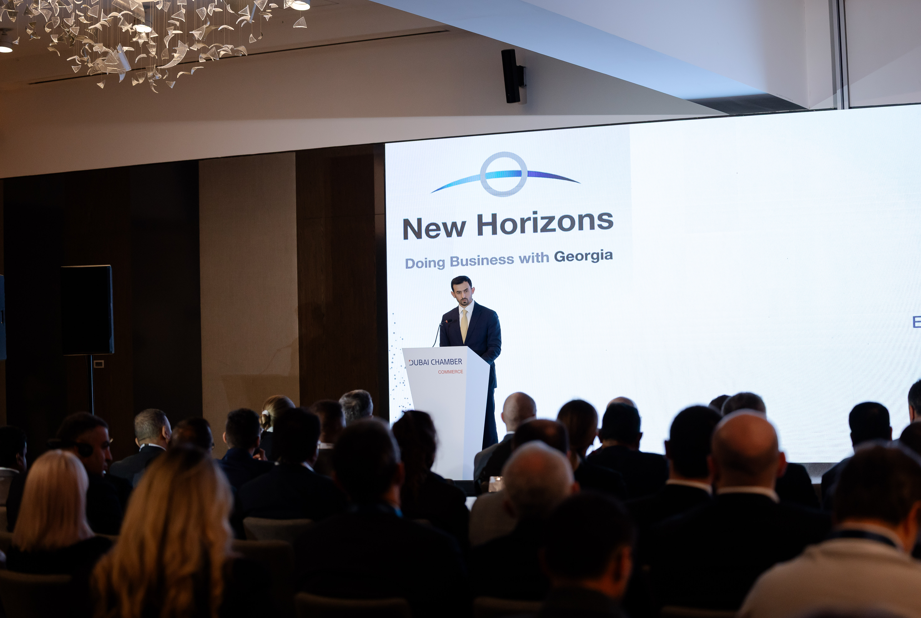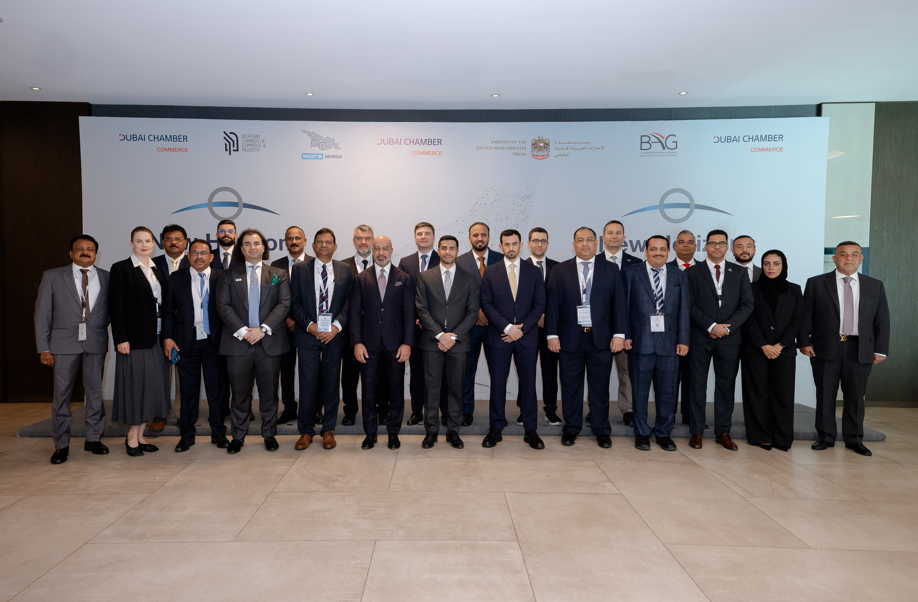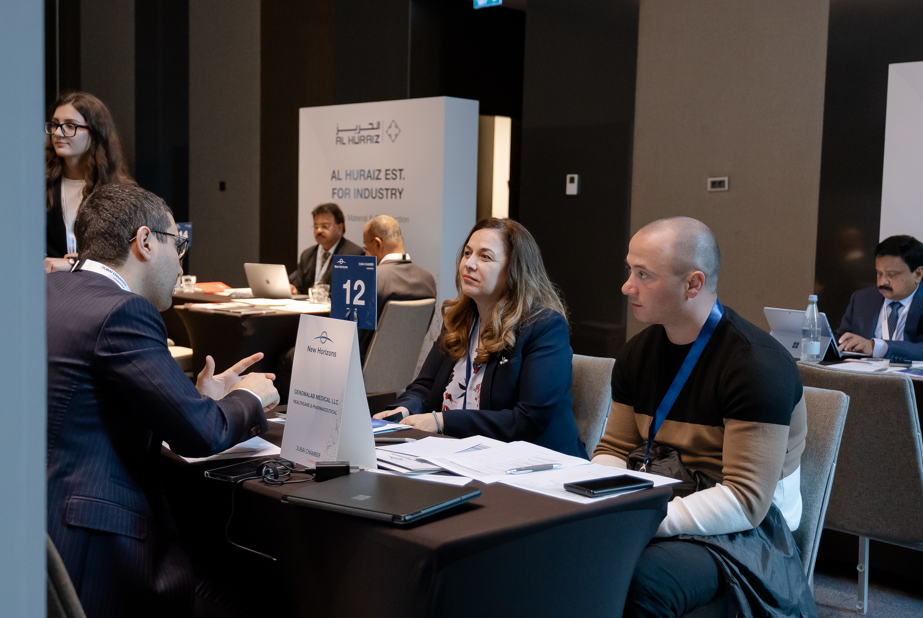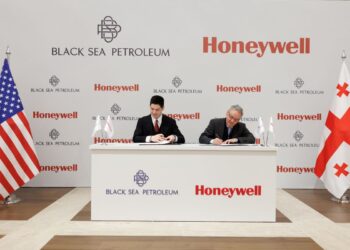By Sofia Bochoidze
On October 21, 2025, the Sheraton Grand Tbilisi hosted a major business forum titled “New Horizons: Doing Business with Georgia.” Dubai Chambers organized the event with the support of partners such as the Embassy of the United Arab Emirates in Tbilisi, the Georgian Chamber of Commerce and Industry, the Embassy of Georgia in the UAE, Invest in Georgia, the Business Association of Georgia, and the Georgian Business Council.
The event brought together senior officials, business leaders, and investors from both countries with one shared goal — to explore opportunities for partnerships, trade, and investment between Dubai and Georgia. The day’s agenda combined networking, plenary sessions, and B2B meetings designed to connect Dubai-based companies with Georgian counterparts across multiple industries.
The forum opened with remarks by Mr. Salem Al Shamsi, Executive Vice President of International Relations at Dubai Chambers, followed by speeches from Irakli Nadareishvili, Deputy Minister of Economy and Sustainable Development of Georgia; H.E. Ahmed Ebrahim Ahmed Taher Alnuaimi, Ambassador of the UAE to Georgia; H.E. George Janjgava, Ambassador of Georgia to the UAE; and Giorgi Pertaia, President of the Georgian Chamber of Commerce and Industry.

The forum featured key sessions such as Via Dubai, presented by Abdulla Baqer, Director for the Middle East and CIS Region at Dubai Chambers, which highlighted Dubai’s role as a leading global business hub and its advantages for companies seeking international expansion. This was followed by “Investing in Georgia: Gateway to Europe and Beyond,” led by Davit Tavlalashvili, Head of Investment at Invest in Georgia, showcasing the country’s investor-friendly environment, liberal economic policies, and strategic position at the crossroads of Europe and Asia.
In his address, Mr. Al Shamsi highlighted Dubai Chambers’ commitment to helping businesses explore new markets and build stronger international partnerships. Throughout the day, participants explored Dubai’s position as a leading global business hub and Georgia’s growing appeal as a gateway to Europe and beyond. The event concluded with a networking lunch and pre-arranged B2B meetings that encouraged meaningful connections and long-term collaboration.
Georgia Today Exclusive: Interview with Mr. Salem Al Shamsi, Executive Vice President of International Relations, Dubai Chambers
After the forum, Georgia Today had the privilege to sit down with Mr. Salem Al Shamsi to discuss Dubai Chambers’ global outreach, Georgia’s growing economic role, and how collaboration between the two markets is evolving.
You’ve been leading trade delegations across many regions — from Asia to Europe. Out of all your international engagements, has there been a market or encounter that surprised you in a way you didn’t expect?

Every market offers unique advantages and perspectives, but what consistently stands out is the shared determination among global entrepreneurs to innovate, grow, and connect.
Whether in Asia, Europe, or Africa, we encounter the same ambition to expand internationally and build lasting business partnerships.
Our trade missions are designed to channel that ambition, positioning Dubai as a global gateway where opportunities, ideas, and partnerships converge.
Each engagement reinforces Dubai Chambers’ belief that collaboration across borders drives sustainable growth for all parties involved.
What convinced Dubai Chambers that now is the right time to deepen economic ties with Georgia? Beyond tourism, what real business value do you see here?
The decision is backed by strong data and momentum; non-oil trade reached US$761 million in 2024, achieving year-on-year growth of 58%.
The number of companies registered as active members of the Dubai Chamber of Commerce also rose to 114 by the end of H1 2025, a clear sign of mutual commercial interest.
Georgia’s strategic location between Europe and Asia offers immense potential, with sectors such as transport and warehousing, tourism, food and beverage, ceramics and glass, plastic production, and real estate holding clear opportunities for Dubai investors.
From your perspective, how are Georgian companies that operate in Dubai performing? What sectors are seeing the strongest traction, and where do you see untapped synergy?
The most prominent sectors for Georgian businesses among our members include trading, real estate, and social services, highlighting a strong presence in key industries.
The UAE–Georgia Comprehensive Economic Partnership Agreement (CEPA), which came into effect in June 2024, is creating new momentum by expanding access for Georgian exports through Dubai. The agreement removes tariffs on most goods and opens new channels for trade in services and investment.
The Dubai Economic Agenda (D33) also creates a wealth of opportunities for Georgian companies, particularly in future-facing sectors of mutual interest.
Dubai is often seen as a launchpad for ambitious entrepreneurs. What separates companies that succeed internationally from those that remain local — especially when entering new markets like Dubai or Georgia?
Successful international companies typically demonstrate adaptability, build meaningful partnerships, and take time to understand local business dynamics.
Dubai Chambers helps companies on this journey by providing market insights, networking opportunities, and connections to the right partners and customers.
Initiatives including the ‘Business in Dubai’ platform streamline the process for companies looking to establish or expand in the emirate, offering guidance and access to services from trusted providers, together with business matching services.
Meanwhile, the recently launched Dubai Founders HQ combines a physical campus with a digital platform to create a collaborative space where entrepreneurs, investors, and enablers can connect, share ideas, and access tailored support.
DFHQ serves as a launchpad for startups and scaleups to grow from Dubai to the world, and is set to play a significant role in achieving the Dubai Economic Agenda’s target of creating 30 unicorns and supporting 400 SMEs by 2033.

The UAE has long-term strategies like the Dubai Economic Agenda D33 and the UAE Centennial 2071. On a more personal level, is there a particular value or principle within these visions that guides your own decision-making?
A guiding value that aligns with both national strategies is building bridges for shared prosperity — a principle reflected in the D33 Agenda’s goal of advancing sustainable, inclusive global growth.
Each international mission we lead aims to create mutually beneficial partnerships that generate tangible value for both economies.
We see economic cooperation not as competition, but as collaboration that fosters innovation, opportunity, and long-term progress in line with the UAE’s Centennial 2071 vision.
Dubai is investing heavily in food security and agri-tech. Georgia has fertile land and production potential yet lacks industrial scale. Do you see room for partnerships in agriculture or sustainability between our two markets?
There is significant potential for cooperation between Dubai and Georgia in agriculture and sustainability. Georgia’s fertile land and high-quality produce complement Dubai’s investment capacity and logistics expertise.
The development of the Foodstuffs, Fruit and Vegetable Market in Dubai — the world’s largest integrated fresh food hub — will create new opportunities for Georgian producers to access regional markets through Dubai’s re-export ecosystem, while also supporting long-term food security goals.
Renewable energy is also emerging as a key area for collaboration, as both Georgia and Dubai continue to prioritize sustainability and energy efficiency.
This forum is titled “Doing Business with Georgia” — and of course, business means investment and deals. But is it only about financial gain? What makes economic cooperation meaningful beyond profit?
Economic cooperation goes beyond transactions; it’s about building mutual understanding, trust, and shared progress.
Face-to-face engagement through events like today’s forum helps strengthen relationships and create the foundations for lasting collaboration.
Exchanging ideas and expertise, whether in technology, trade, or sustainability, can have a long-term positive impact for both sides.
Ultimately, success is not only measured in commercial terms, but in the jobs created, skills developed, and opportunities that benefit our wider communities.
Forums like this are inspiring, but often the challenge lies in what happens after the event. How can Georgia ensure that today’s connections turn into real results?
It’s important to maintain the same level of momentum once the event concludes. We achieve this by keeping communication open and ensuring that the conversations started here continue in a structured and practical way.
Regular engagement through business councils, trade missions, and joint initiatives enables continuous collaboration between our business communities, turning connections into long-term partnerships that drive mutual growth.
Dubai is diversifying beyond traditional sectors — into digital trade, sustainability, and creative industries. Do you believe arts and culture can influence economic diplomacy?
Arts and culture play an important role in building understanding between people and creating common ground for cooperation. They help foster trust, which is essential in any successful business or diplomatic relationship.
Cultural exchange also contributes to a city’s overall appeal, attracting creative talent, innovation, and investment that support broader economic growth.
When a Georgian entrepreneur or company wants to enter the UAE market, what determines whether they succeed?
Success in a new market often depends on how well a company integrates into the local business environment. It’s about building the right relationships, understanding regulations, and adapting to market needs.
At Dubai Chambers, we support this process by connecting companies with Business Groups, Councils, and networks that help them establish a strong foundation for long-term growth.
Every success story comes with challenges. What are the main obstacles in Georgian–Dubai business relations, and how are you addressing them?
It’s important to ensure that businesses in both markets have a clear and up-to-date understanding of each other’s opportunities and regulatory environments.
We address this by prioritizing direct engagement through trade missions, forums, and targeted B2B meetings that bring our business communities together.
The Georgian Business Council, operating under Dubai Chamber of Commerce, serves as an active platform for dialogue, helping to strengthen ties, exchange market insights, and build long-term partnerships.
After this forum, what comes next in Dubai Chambers’ agenda regarding Georgia and the wider region?
This mission represents another step forward in the growing partnership between Dubai and Georgia. Our focus will be on building on the valuable connections made here, ensuring dialogue continues and new areas of collaboration are explored.
We see real potential to develop joint initiatives that bring our business communities closer together, whether through trade promotion, knowledge exchange, or sector-specific cooperation.
We are confident that this forum will contribute to the development of lasting partnerships that unlock shared opportunities in both markets.
As the forum came to an end, one message was clear: the partnership between Dubai and Georgia is starting a new and promising chapter, built on connection, collaboration, and a shared vision for progress.














